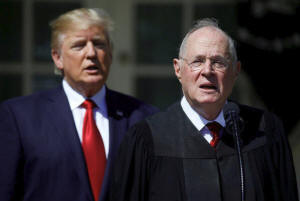|
Democrats face uphill fight if Trump gets
second U.S. high court pick
 Send a link to a friend
Send a link to a friend
 [April 12, 2017]
By Lawrence Hurley [April 12, 2017]
By Lawrence Hurley
WASHINGTON (Reuters) - If Democrats thought
it was hard to stop President Donald Trump's first U.S. Supreme Court
nominee, it promises to be even tougher for them if he gets to fill
another vacancy, potentially to replace the most influential justice,
Anthony Kennedy.
Kennedy, a conservative who sometimes sides with the court's liberals in
key cases such as on gay rights and abortion, is one of three justices
78 or older. Justice Stephen Breyer is 78 and fellow liberal Ruth Bader
Ginsburg is 84.
Former Kennedy Supreme Court clerks said the justice, who turns 81 in
July, may be pondering retirement either this year or in 2018.
That would give Trump a further chance to shape the court after his
first nominee, Neil Gorsuch, was sworn in on Monday for the lifetime job
to replace the late conservative Justice Antonin Scalia after overcoming
fierce Democratic opposition in the Senate confirmation process.
Kennedy administered Gorsuch's judicial oath at a White House ceremony,
and Trump heaped praise on a justice who has spent nearly three decades
on America's top court, calling him "a great man of outstanding
accomplishment."

Gorsuch is one of Kennedy former clerks. Kennedy is planning a reunion
of his clerks in June rather than next year as had been expected.
Kennedy, through a court spokesman, declined to comment on his plans.
The implications for the court if Kennedy were to step down are
enormous. For the past decade he been its swing vote in major cases.
Gorsuch's confirmation restored the court's 5-4 conservative majority.
If whenever Kennedy leaves the bench he is replaced by a stalwart
conservative, that would move the court further to the right.
Republicans possess a 52-48 majority in the Senate. In order to secure
Gorsuch's confirmation, they voted to prohibit a procedural roadblock
called a filibuster that had required a super-majority of 60 votes to
allow a confirmation vote for Supreme Court nominees, leaving the
minority Democrats with little ammunition for the next nomination fight.
"I think it will be very hard for Democrats to get much traction to
derail a future Trump nominee without the threat of a filibuster,"
George Washington University political scientist Sarah Binder said.
But Democrats and Republicans still are predicting a fierce fight over
the next court vacancy.
'I EXPECT ARMAGEDDON '
"For the life of me I don't understand why the Democrats made such a
fuss about this one. They look stupid," Republican Senator Orrin Hatch
said last week of Gorsuch's nomination. "I expect Armageddon on the next
one because that's going to change, assuming Trump gets another one, the
direction of the court. It would certainly keep the court in a more
conservative mode for a long time."
[to top of second column] |

U.S. President Donald Trump listens as Justice Anthony Kennedy
speaks before swearing in Judge Neil Gorsuch as an Associate Supreme
Court Justice in the Rose Garden of the White House in Washington,
U.S. on April 10, 2017. REUTERS/Joshua Roberts/File Photo

A Democratic congressional aide added, "The opposition to Gorsuch
could look weak compared to what a similarly conservative nominee
would face, if it would tip the balance on the court."
Kennedy is the longest-serving of the nine justices. He was
nominated by Republican President Ronald Reagan in 1987 and
confirmed by the Senate in 1988 after Democrats thwarted Reagan's
first choice, outspoken conservative Robert Bork, and his second
pick, Douglas Ginsburg, withdrew from consideration.
Although he has sided with his conservative colleagues on many
issues, Kennedy has supported liberal causes such as gay rights,
culminating in writing the landmark 2015 ruling legalizing same-sex
marriage nationwide.
He also joined the liberals in upholding abortion rights. In 2016,
Kennedy joined the court's four liberal justices in a ruling
striking down a Texas abortion law imposing strict regulations on
doctors and facilities in the strongest endorsement of U.S. abortion
rights in more than two decades.
He also authored a 2016 ruling upholding the consideration of race
in college admissions, joined by the court's liberals.
University of Georgia School of Law professor Lori Ringhand said
Republicans may be wary of defending an extremely conservative court
nominee with the midterm congressional elections coming up in 2018,
if another vacancy arises.

"It's not clear it would be to the electoral advantage to
Republicans to have a hotly contested Supreme Court nomination right
before the midterms that highlighted a nominee's extremely
conservative positions on social issues that the majority of the
public have actually accepted," Ringhand said.
(Reporting by Lawrence Hurley; Additional reporting by Andrew Chung;
Editing by Will Dunham)
[© 2017 Thomson Reuters. All rights
reserved.]
Copyright 2017 Reuters. All rights reserved. This material may not be published,
broadcast, rewritten or redistributed. |